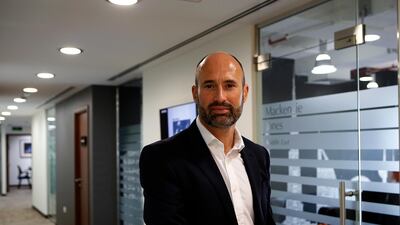Arabian Gulf recruiters are expecting more applications from UK professionals if the European country’s job market slows down amid Brexit turmoil – but there has been no surge yet.
Consultancies based in the UAE said rather than a flurry of UK candidates looking for new opportunities as the Brexit deadline nears, there has been no difference to other years. However, that could all change.
"The UK has yet to be hit by the real ramifications of Brexit and we will see more of a migration away from the UK in the next six to 12 months,” says David Mackenzie, the managing director of the GCC recruitment consultancy Mackenzie Jones, adding that up to 80,000 jobs may be lost in London alone.
“Brexit has been on the jobs horizon for over three years and if anything we have seen less applications in the last 18 months. I think the external perception of the UK is actually very different from what is happening. The UK recruiters are doing well and reporting good figures for the back of 2018 and the beginning of 2019.”
Media reports have warned of multiple job losses when the UK exits from the European Union with a January report commissioned by the mayor of London, Sadiq Khan, for example, stating a no-deal Brexit could see the country lose half a million roles and nearly £50 billion in investment.
However, so far Britain’s labour market has defied a slowdown. Figures released last month by the UK’s Office for National Statistics found the number of people in work rose by 167,000 in the three months to December, the biggest increase since the first quarter of 2018 and stronger than the poll’s forecast of 140,000.
Not only that, British workers’ pay growth maintained its fastest pace in a decade in late 2018, suggesting the labour market was buoyant ahead of Brexit while the broader economy slowed.
However, experts say such high levels of job creation could be because firms are choosing to hire staff rather invest in new machinery or software as it will be easy to let them go if they need to change tack.
“There is an element of uncertainty and this is affecting companies’ attitude towards expansion,” says Mr Mackenzie.
Sanjay Raja, a UK economist at Deutsche Bank in London told Bloomberg last month that over the past few years there has been a slowdown in capital investment, which has fuelled a labour boom.
“In a no-deal scenario, it’s likely that we would see both investment and employment contract,” he added.
This could lead to a rise in applications for jobs in the GCC region with the UAE, Bahrain, Saudi Arabia and Kuwait particular hot spots for UK expatriates, experts say.
“If the UK job market does slow down then we will get an increase in applications, however, the UAE already has a surplus of good talent so the jobless Brits may have to look further afield to find their next home," says Mr Mackenzie.
This was echoed by Chris Greaves, the managing director of Hays Gulf Region, who says professional Britons would indeed turn their attention to the region if the UK crashes out of the EU - as well as other parts of the world.
“I don’t know whether it would just be the Middle East – but also Singapore, South-East Asia and Australia,” he says. “However, the UAE is so much nearer [to the UK] and many know people that have been here on holiday or have passed through. It becomes easier and easier for Britons to project themselves into working here.”
Yet, while UK professionals may look to the UAE for a better option, “whether there are the jobs for them is another matter”, say Mr Greaves.
“Typically an employer here will want someone with regional experience unless it is a skill set they have to go overseas to find,” he adds. “For most regular run-of-the-mill jobs, employers will favour someone already in the GCC that has local experience; it’s only your quirkier areas of IT, digital, rail, nuclear, space programmes – areas which are being developed here for the first time - where employers will look internationally for expertise.”
Gareth El Mettouri, associate director of global recruitment firm Robert Half UAE, says he has noticed an increase in applications from newly qualified accountants, FinTech staff and finance managers in the UK – but only in line with normal hiring patterns.
“You always tend to see an uptick in the first quarter of the year,” he says. “Bonuses are paid, Christmas is over, people in the UK want to move to a warm destination and there are fantastic opportunities for candidates in terms of career progression, start-ups and new industries. But I don’t think anyone’s put their hand up to say 'I want to move to the UAE because I’m afraid of Brexit.'”
There is now some evidence of job loss in the UK as a direct result of Brexit. While fewer bankers have left London than was first estimated, the world’s biggest banks have outlined plans to transfer several thousand staff to cities such as Madrid, Paris and Dublin. Those shifts are likely to be irreversible, according to the lobby group TheCityUK. And Honda’s recent announcement that it will close a plant with the loss of 3,500 jobs and Nissan’s decision not to build a new model of one of its cars in Britain have also raised concerns.
Ultimately, though, it is unknown territory.
“We’ve never been in this situation before and who knows which way it is going to go,” says Mr El Mettouri.




